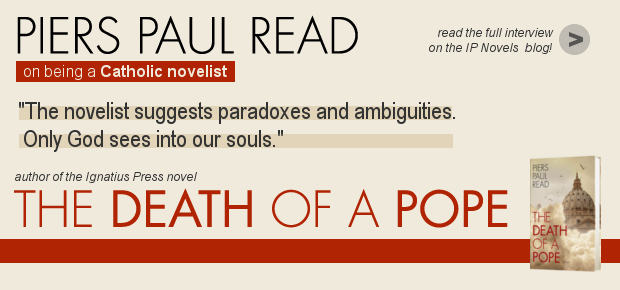Things tagged fiction
Articles
-

How ideology is poisoning storytelling and rattling readers
by T. M. Doran
May 1, 2017 5:46 pm Leave a Comment
Every writer brings a perspective to his or her creative work, but there’s a difference between bringing a perspective to storytelling and using storytelling as a means to impose the author’s views on the reader. With thousands of radio and television shows and an unfettered Internet, the commercial and cultural… Read more »
-

When 256 Pages Can Say What 15,000 Pages Do Not Say
by James Casper
January 8, 2015 2:51 pm Leave a Comment
As recently reported in the media, the Chicago Archdiocese has released 15,000 pages of its files related to substantiated priest sexual abuse against minors. Previously, the Archdiocese of St. Paul, Minnesota in response to legal action, released a large trove of similar records. While these public disclosures are good news,… Read more »
-

This review was originally published at A Prince of the West. I try to order new novels from my publisher whenever I can afford to, partly to encourage them to keep publishing fiction and partly out of solidarity with my fellow authors. Sadly, the results are sometimes mixed, but lately… Read more »
-

News & Links on the Feast of Mother Cabrini
by Ignatius Press Novels
November 13, 2013 5:36 pm Leave a Comment
Here’s a sampling of what’s been going on in the literary and Catholic world recently. CatholicFiction.net reviews Meriol Trevor’s Shadows and Images, calling it “a deeply moving love story, beautifully written” with “echoes of Jane Austen”. It also has more than an echo of Bl. John Henry Newman’s conversion story,… Read more »
-

Many in the world are formed, at least in part, by fiction, and if they don’t experience the Catholic perspective (as distinct from Catholic doctrine, commentary, and apologetics) there will be little or no counterbalance to the secular perspective. Literature from a Catholic perspective can be evangelizing in the sense… Read more »
-


Piers Paul Read is perhaps best known for his non-fiction account of the 1972 airline disaster involving Uruguayan Air Force Flight 571, a plane carrying 45 passengers that crashed in the Andes. His book, Alive: The Story of the Andes Survivors, became a world-wide bestseller and, in 1993, was made into a film starring Ethan Hawke.
Mr. Read is also an accomplished novelist and playwright, as well as a journalist, biographer, and social commentator. His recent works include the novels Knights of the Cross and Alice in Exile, and the non-fiction titles The Templars: The Dramatic History of the Knights Templar; Alec Guinness: The Authorised Biography; and Hell and Other Destinations.
Piers Paul Read’s novel, The Death of a Pope, has garnered acclaim from fellow novelists Ron Hansen and Ralph McInerny. A thriller that intertwines real events with fiction, The Death of a Pope touches on many themes that are hot-button issues in the Catholic Church and the world today.
(Note: this interview was originally published in 2009 in conjunction with the release of The Death of a Pope.)
What inspired you to write The Death of a Pope?
When I was young I was a zealous exponent of Liberation Theology. As I grew older I like to think I grew wiser and came to see how ‘social’ Catholicism, however superficially appealing in the face of the suffering caused by poverty and injustice, in fact falsifies the teaching of the Gospels. This is particularly true when it condones or even advocates the use of violence: as Pope Benedict XVI puts it in his encyclical Spe Salvi, “Jesus was not Spartacus, he was not engaged in a fight for political liberation”. Yet this was precisely the message preached from the pulpits in Catholic parishes and taught in Catholic schools in the last decades of 20th century. The two visions of what charity demands of a Christian confront one another on the issue of the AIDS epidemic in Africa. It is this confrontation that gave me the idea for my novel.
You’ve written quite a bit in both fiction and non-fiction. The Death of a Pope, though fiction, is interwoven with real events, situations, and ideological tensions. Do you see a clear line between what you create and the real world you’re drawing from?
I have always taken the view that a work of non-fiction should be just that, whereas anything is allowed in a novel. In Alive: The Story of the Andes Survivors, for example, there are snatches of dialogue which may not use the precise words used by the characters but they are not invented: the exchanges come from my interviews with the survivors.
As a novelist I am a realist and use actual events and institutions to add verisimilitude to the story. There is a danger of tipping the novel into a kind of fictionalised journalism, but that is avoided if the story itself comes from the imagination and the fictional characters have distinct personalities and convincing motives for what they do.
The Death of a Pope begins with a series of quotes, including one from Polly Toynbee from the UK paper The Guardian, claiming that “The Pope kills millions through his reckless spreading of AIDS.” Is this an attitude that is widespread in journalism today?
The pope that Polly Toynbee had in mind was Pope John Paul II but she would level the same charge, after his air-born press conference on the way to Africa in March, 2009, at Pope Benedict XVI. Toynbee is an atheist and militant secularist, and she sees in Catholic misgivings about the use of condoms to prevent the spread of AIDS a stick with which to beat the Church. Her views are widely shared in the secular media, even if they are not so pungently expressed. Liberal Catholics, too, such as the late Hugo Young — a highly influential columnist — sometimes adopted this secularist outlook: he talked of the record of Pope John Paul II as “an offence against elementary tenets of liberal decency”.
In a way, The Death of a Pope is quite critical of the more radical form in which Liberation Theology can manifest itself. Is this based on your own experience with radicalism when reporting from El Salvador?



